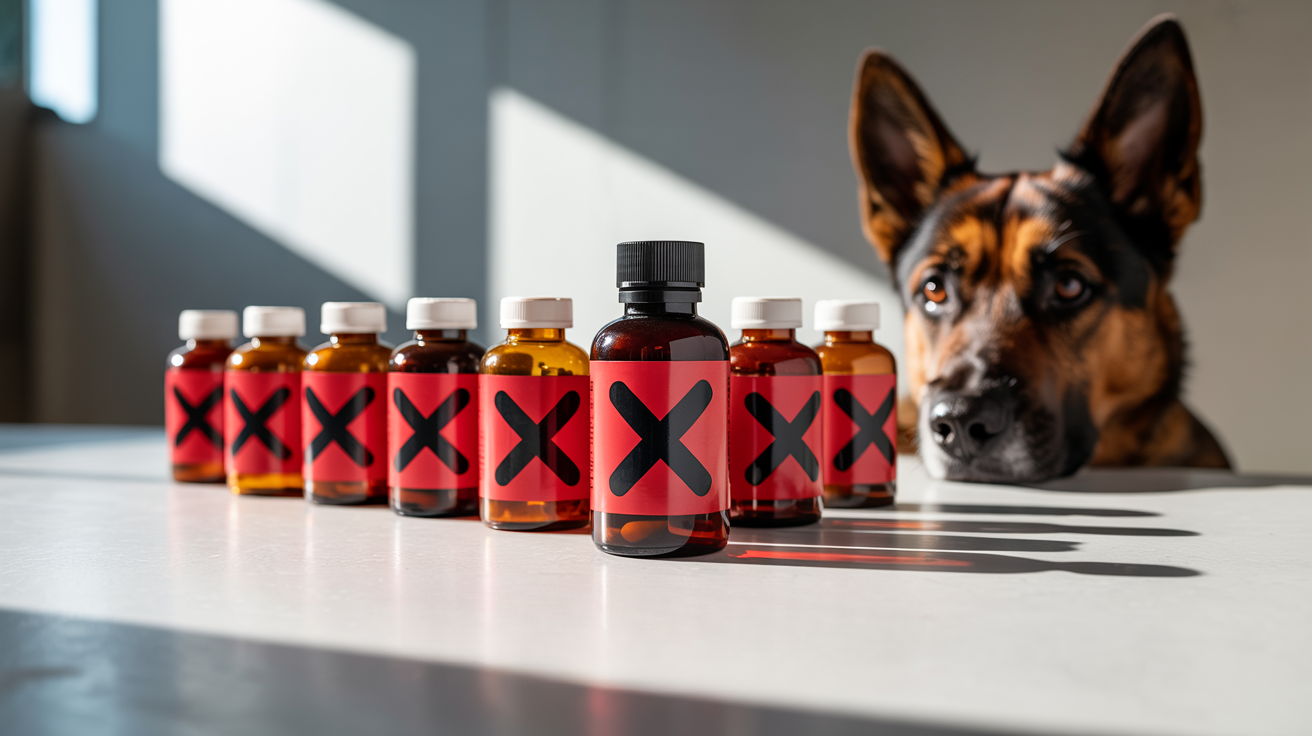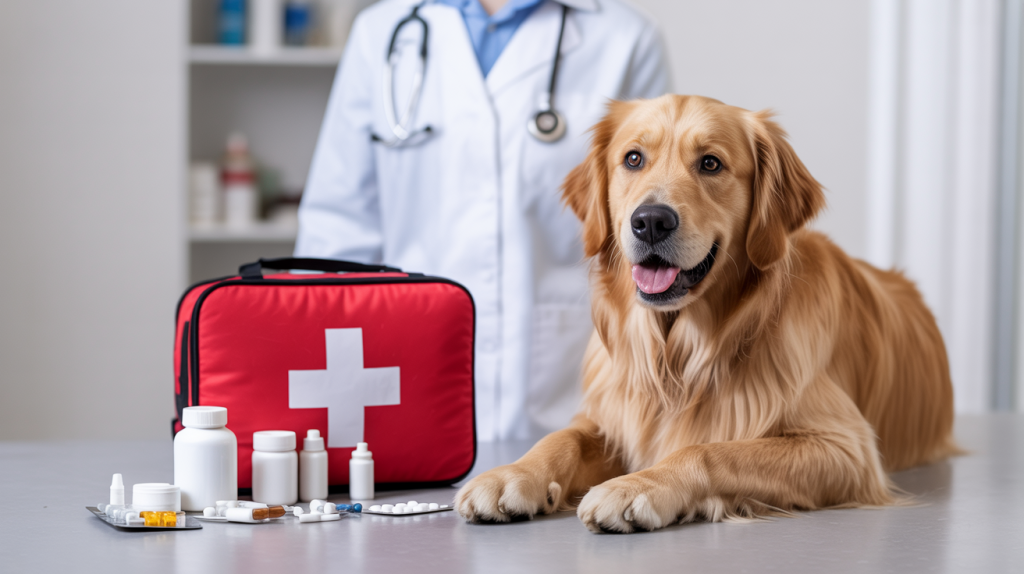Every dog owner faces that moment when their furry friend isn’t feeling well and wonders if human medicine could help.
Many pet parents don’t realize that some over-the-counter medications can actually be safe for dogs when used correctly.
But here’s what most people miss: the wrong choice could be dangerous, while the right one might provide the relief your dog needs.
This blog will show you exactly what over the counter medicine is good for dogs, plus the safety tips every pet owner should know before reaching for that medicine cabinet.
Understanding OTC Medications and Your Dog’s Health

When it comes to treating dogs with human medications, pet owners often feel confused and worried.
Dogs process medications differently than humans do. Their bodies break down drugs at different rates, and what helps people might harm pets.
Size matters a lot here. A small Chihuahua needs much less medicine than a Great Dane, but it’s not just about weight. Dogs also have different liver functions and kidney processing abilities compared to humans.
Some human medicines work well for dogs when given properly. Others can cause serious problems or even be deadly. That’s why knowing what over the counter medicine is good for dogs becomes so important for responsible pet ownership.
The key lies in understanding which medications are safe, what dosages work, and when to call a vet instead.
Many common household remedies that seem harmless can actually cause stomach upset, liver damage, or worse in dogs.
Smart pet parents always research first and consult their veterinarian before giving any human medication to their four-legged family members.
Vet-Approved Over the Counter Medications for Dogs
Not all human medications are off-limits for dogs. Some over-the-counter options have earned veterinary approval for treating common canine health issues.
Here are the most trusted OTC medications that many vets recommend for dogs, along with their typical costs and what you should watch out for.
| Name | Price (Approx.) | What Is It For | Possible Side Effects |
|---|---|---|---|
| Benadryl (Diphenhydramine) | $5–$10 | Allergies, itching, mild anxiety | Drowsiness, dry mouth, urinary retention |
| Zyrtec (Cetirizine) | $10–$15 | Allergies, itching | Drowsiness, vomiting, hyperactivity |
| Claritin (Loratadine) | $12–$16 | Allergies, itching | Dry mouth, upset stomach |
| Pepcid AC (Famotidine) | $8–$15 | Upset stomach, acid reflux | Loss of appetite, diarrhea, fatigue |
| Imodium (Loperamide) | $7–$12 | Diarrhea | Constipation, bloating, sedation |
| Neosporin (Topical) | $6–$10 | Minor cuts, scrapes, skin wounds | Skin irritation, allergic reaction |
| Artificial Tears (Eye Lubricant) | $8–$14 | Dry eyes, minor eye irritation | Eye redness, discharge |
| Hydrocortisone Cream | $7–$12 | Itching, minor skin irritations | Skin thinning (with overuse) |
| Dramamine (Dimenhydrinate) | $6–$10 | Motion sickness | Drowsiness, dry mouth, urinary retention |
Important Note: Always consult your veterinarian before giving any OTC medication to your dog, as individual health conditions and dosages may vary.
Over the Counter Medications to Avoid at All Costs

While some human medications can help dogs, many common household medicines are extremely dangerous for our pets. These medications can cause serious illness or death, even in small amounts.
1. Acetaminophen (Tylenol)
Acetaminophen is highly toxic to dogs and can cause severe liver damage, even in small doses. It creates harmful chemicals that dogs can’t process, while also damaging red blood cells.
Why It Should Be Avoided: Dogs lack proper enzymes to break down acetaminophen safely, leading to liver failure and blood poisoning that can be fatal.
2. Ibuprofen (Advil, Motrin)
Ibuprofen is extremely dangerous for dogs, causing stomach ulcers, kidney failure, and brain problems. It blocks important chemicals that protect the stomach lining and help kidneys work properly.
Why It Should Be Avoided: Even a single tablet can cause life-threatening internal bleeding and organ failure in dogs, especially smaller breeds.
3. Naproxen (Aleve)
Naproxen can cause stomach bleeding, kidney failure, and severe belly pain in dogs. It stays in a dog’s system much longer than in humans – about 74 hours compared to 12-15 hours in people.
Why It Should Be Avoided: The extremely long-lasting effect makes it the most dangerous over-the-counter pain medicine, with toxicity lasting for days.
4. Pseudoephedrine (Sudafed)
Pseudoephedrine can lead to rapid heart rate, seizures, and high blood pressure in dogs. It overstimulates the nervous system, making dogs hyperactive and shaky.
Why It Should Be Avoided: The effects can last for days and may cause heart failure or brain damage, with no specific treatment available.
5. Aspirin
Aspirin may seem harmless, but it can cause stomach ulcers, internal bleeding, and kidney damage in dogs. It permanently damages blood cells that help with clotting.
Why It Should Be Avoided: Dogs process aspirin differently than humans, and the permanent damage to clotting cells creates ongoing bleeding risks.
6. Loperamide (Imodium) – Human Formulations
Human Imodium can cause toxic reactions, especially in certain breeds, leading to severe brain problems. Herding dogs like Collies and Australian Shepherds are at highest risk.
Why It Should Be Avoided: Certain dog breeds lack protective barriers in their brain, allowing this drug to cause depression and potentially coma.
7. Bismuth Subsalicylate (Pepto-Bismol)
Pepto-Bismol contains chemicals similar to aspirin, which can be toxic to dogs. When dogs digest this medicine, it breaks down into compounds that damage their stomach lining.
Why It Should Be Avoided: The aspirin-like compounds cause internal bleeding and affect how cells make energy, leading to weakness and organ problems.
8. Antihistamines with Decongestants
Products with names ending in “-D” contain stimulants that make dogs’ hearts race dangerously fast. These combinations can cause heart problems and high blood pressure.
Why It Should Be Avoided: The combination creates multiple toxic effects that are difficult to treat and can cause fatal heart rhythm problems.
9. Topical Creams with Steroids or Zinc
Many human skin creams contain steroids or zinc, which can be harmful if dogs lick or eat them. Dogs are attracted to the taste and texture of these creams.
Why It Should Be Avoided: Zinc destroys red blood cells while steroids disrupt hormone systems for weeks, with even small amounts causing serious health problems.
Natural and Alternative Options You Can Look out For

When you’re wondering what over the counter medicine is good for dogs, sometimes the safest approach involves natural remedies that have been used for years.
These gentle alternatives can help with minor issues while you contact your vet.
- Honey: Raw honey works as a natural antiseptic for small cuts and scrapes. Apply a thin layer to clean wounds to help prevent infection and speed healing.
- Coconut Oil: This natural moisturizer can soothe dry, itchy skin when applied topically. A small amount can also help with digestion when added to food.
- Pumpkin Puree: Plain canned pumpkin (not pie filling) helps with both diarrhea and constipation in dogs. The fiber content helps regulate their digestive system naturally.
- Cold Compress: A cold, damp cloth can reduce swelling from minor bumps or insect bites. Apply for 10-15 minutes at a time to provide relief.
- Oatmeal Bath: Ground oatmeal mixed with warm water creates a soothing bath for dogs with itchy skin. This gentle remedy can calm irritation without harsh chemicals.
Signs Your Dog Needs a Vet

Sometimes home remedies and over-the-counter treatments just aren’t enough for your dog’s health problems. Knowing when to stop trying DIY solutions and get professional help can save your pet’s life.
Watch for these warning signs that mean it’s time to call your vet right away.
- Vomiting or diarrhea that lasts more than 24 hours or contains blood
- Difficulty breathing, excessive panting, or blue-tinged gums
- Inability to urinate or defecate, or straining without results
- Severe pain shown through whimpering, panting, or refusal to move
- Loss of appetite for more than two days
- High fever or body temperature below normal
- Persistent coughing or choking sounds
Finishing It Up
Understanding what over the counter medicine is good for dogs puts you ahead of most pet owners who make dangerous guessing games with their furry family members.
You now know which medications can help and which ones could kill your dog within hours.
Your dog’s safety depends on the choices you make today. Keep all human medications locked away from curious paws. Never assume what works for you will work for your pet.
When you’re unsure about what over the counter medicine is good for dogs, pick up the phone and call your vet instead of taking risks.
Just know that your dog trusts you completely to make the right decisions for their health and well-being.









